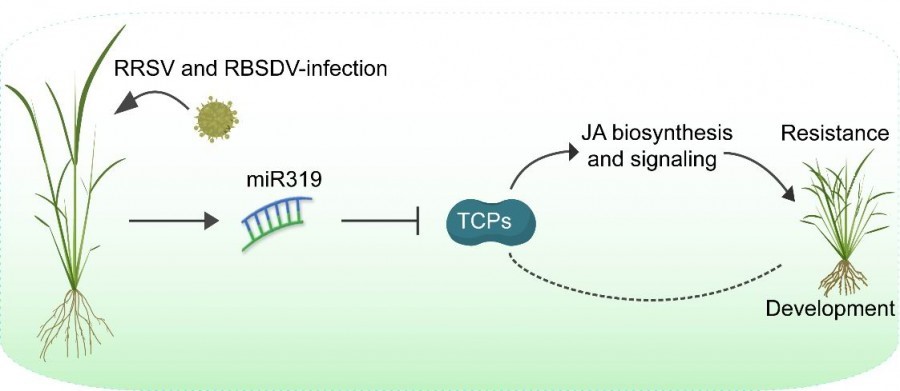2016年7月2日,国际著名学术杂志《Cell》子刊《Molecular Plant》杂志在线发表了福建农林大学吴祖建和吴建国课题组合作题为“Suppression of Jasmonic Acid-mediated Defense by Viral-inducible MicroRNA319 Facilitates Virus Infection in Rice”研究性论文。此项研究揭示了由miR319参与调控的水稻锯齿叶矮缩病毒(RRSV)致病(矮化和叶片锯齿状缺刻)机制,进一步研究发现该机制可能同样适于水稻黑条矮缩病毒(RBSDV)的致病过程。

图1 病毒诱导的miR319参与RRSV和RBSDV致病机制模型
文章全文链接:http://www.sciencedirect.com/science/article/pii/S1674205216301277
原文摘要:
MicroRNAs (miRNAs) are pivotal modulators of plant development and host-virus interactions. However, there exist few examples related to a specific miRNA involved in viral infection or host susceptibility. In this study, we show that the Rice ragged stunt virus (RRSV) infection increases the accumulation of miR319 and inhibits the expression of miR319-regulated TCP (TEOSINTE BRANCHED/CYCLOIDEA/PCF) genes, especially TCP21, in host plants. Transgenic rice plants overexpressing miR319 or down-regulating TCP21exhibited disease-like phenotypes, and showed significantly higher susceptibility to RRSV as comparison with the wild-type plants. In contrast, only mild disease symptoms were observed in RRSV-infected lines overexpressing TCP21. This was particularly pronounced in the transgenic plants overexpressing miR319-resistant TCP21. Both RRSV infection and overexpression of miR319 caused the decrease of endogenous jasmonic acid (JA) levels along with down-regulated expression of JA biosynthesis and signaling-related genes in rice. However, treating rice with methyl jasmonate (MeJA) alleviated disease symptoms caused by RRSV and also reduced virus accumulation. Taken together, our results suggest that the induction of miR319 by RRSV infection in rice suppresses JA-mediated defense to facilitate virus infection and symptom development.
日期:2016-07-15 来源:生物帮 网址:http://cell.bio1000.com/cell/201607/967.html

